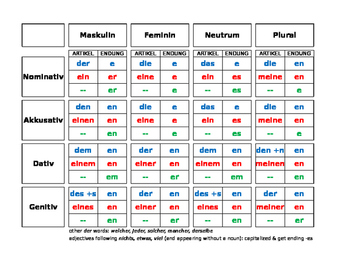

Page description: Nouns describe people, animals, things, concepts and ideas. Ich will nicht dieses Armband kaufen, sondern jenes. Grimm Grammar is an online German grammar reference from the University of Texas at Austin. I don't want to buy this bracelet, but that one. Although the pronoun "jener" means "that", it is really only used in certain formal registers or to contrast with "dieser", which should otherwise be used to translate "that": Here are some more exercises for you to practice the adjective endings in German. Refers to something that is far or farther in time or distance. When placed in front of a noun, it declines as follows: It corresponds to English "this", but as it is used in contexts where the difference between near and distant is not crucial, it often equates to English "that". Refers to something that is near or nearer in time or distance. I know that sounds confusing, but let’s take a look at two simple tables, one with the possessive pronouns and one with just the definite articles.Definition: Demonstrative adjectives are: dieser and jener.

This is because the exits for each possessive pronoun are the same as the exit of their definite article. If you’re used to how German pronouns work as well as how cases behave, it won’t be too bad, though. In English this isn’t a huge deal as the word doesn’t change, but in German it does. When you say “that’s my book”, “my” is a possessive pronoun being used as an adjective. Possessive adjectivesįinally, let’s take a look at a few adjectives that can be confusing, namely ones that are a possessive pronoun. When speaking nobody will mind too much if you make a mistake, but in written German it stands out like a sore thumb.Īlso, if you’re curious why it’s an der Ecke, check out my guide to German prepositions. This is the kind of thing you really need to keep an eye on when practicing your German. Here, grosser changed because of the indefinite article ein in combination with he masculine noun Mann. This form is used not only in dictionaries, but also in descriptive sentences like this one: When you look up a German adjective in the dictionary, you get a form that I’ll just call the basic one.įor example, look up “big” and you’ll find gross, look up small and you’ll see klein. The only exception are possessive adjectives - something we get to in the second half of this guide.įirst let’s look at the basic, unchanged forms of adjectives and when to use them. Thankfully, all they change are the endings, which can differ based on the case and gender of the noun. So it’s a “small house” not a “house small”.Īs I mentioned before, German adjectives change a little depending on the noun they belong to. Occasionally you’ll run into some poetic license, but as a rule, adjectives go first. The first thing you need to know about German adjectives is that, like in English, they go before the noun they belong to. Still, like all things German, it can get a little tricky here and there.Īs usual this will also mean that there’s going to have to be some rote learning if you’re going to get this right on a regular basis.

It’s not like in French where certain adjectives change according to a noun’s gender, or the mad declensions of Greek.

However, in German things are a little different: in English, nouns and adjectives don’t change depending on how we use them in a sentence. We use them every day and German speakers are no different. The tall man, the small house - these are examples of adjectives in use. Just like in English, or Spanish or really any other language, adjectives are used to describe things and people. These kinds of changes are what I’ll be explaining in this article and hopefully I can help you make some sense of how adjectives behave in German. When used in this way, they must be given. If you have a sharp eye, you’ve probably also noticed that German adjective endings can change according to the case of the noun they belong to. In German, adjectives come before the noun they are qualifying, just like in English - the old man is der alte Mann. If you’ve started learning German, you’ll quickly come across adjectives - words that describe a noun.


 0 kommentar(er)
0 kommentar(er)
